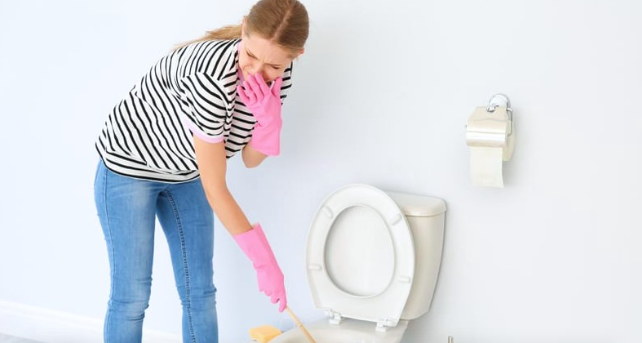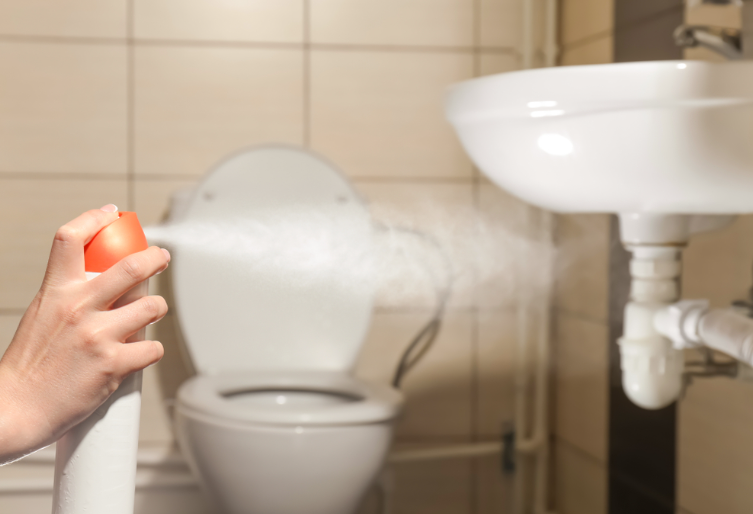There’s a certain comfort in the familiar aroma of a clean, fresh bathroom. However, an intrusive scent reminiscent of rotten eggs can quickly disrupt this tranquility, sparking concerns about potential plumbing issues, or worse, health risks. If you’ve ever asked, “Why does my bathroom smell like rotten eggs?”, this comprehensive guide will delve into the mystery, bringing you reliable solutions from industry experts for the answer of “Rotten Egg Smell in Bathroom”.
Understanding the Cause: The Sulfur Smell in Your Bathroom

The root cause of the offensive odor in your restroom can be traced to hydrogen sulfide, a gas notorious for its distinct rotten egg smell. It’s a common byproduct in sewage systems and is naturally occurring in many places, including your bathroom’s plumbing.
Most of the time, the problem stems from the plumbing system – dried-out p-traps, a blocked vent pipe, or even biofilm accumulated on drains can contribute to the permeation of this odorous gas. Sometimes, the problem can be more severe, such as an issue with your septic system or sewer line, which may necessitate professional intervention.
Is the Sewer Gas in Your Bathroom Dangerous?
One commonly asked question is, “What are the health risks associated with a sewer gas smell in the bathroom?” While the unpleasant odor is certainly not enjoyable, low concentrations of hydrogen sulfide (the source of your sulfuric smell) are generally not harmful. However, persistent and higher levels can cause symptoms like nausea, headaches, and eye irritation. In very rare cases, very high concentrations can pose serious health risks. If the rotten egg smell in your restroom persists, it’s crucial to address the issue immediately.
Your DIY Solution: How to Get Rid of the Foul Odor in Your Bathroom
The good news? There are practical steps you can take at home to eradicate this rotten egg smell. Let’s take a look at some easy-to-follow procedures that you can start implementing right away:
- Keep Water in the P-Traps: P-traps are designed to keep a small amount of water, acting as a barrier against sewer gases. If a drain hasn’t been used for a while, the water can evaporate, allowing gases to seep into your home. Regularly running water in seldom-used sinks, tubs, or showers can prevent this problem.
- Clean Drains Regularly: Biofilm (a collection of organic matter and bacteria) on your drains can produce hydrogen sulfide. Regular cleaning with a mixture of vinegar and baking soda can help control this issue.
- Inspect the Toilet’s Wax Ring: The wax ring creates a seal between the toilet and the sewer pipe. If it’s faulty or worn out, sewer gas can escape. Consider replacing it if the problem persists.
Seek Professional Help: Dealing with Persistent Sewage Smell in Your Bathroom

If your DIY efforts don’t yield results or if the smell returns repeatedly, it might be time to call in the professionals. Plumbers are well-versed in detecting and rectifying plumbing issues, and if necessary, they can conduct a thorough inspection of your septic system or sewer line. So, if you’re dealing with a stubborn rotten egg smell in your bathroom, don’t hesitate to reach out to a trusted professional.
Venting the Problem: The Role of Blocked Vent Pipes
The vent pipe plays a critical role in your plumbing system. It allows sewer gases to escape outside your home, maintaining the pressure balance required for your drains to function correctly. Sometimes, these vent pipes can become blocked, causing a buildup of sewer gases which then find their way into your home.
The blockages can be caused by a range of factors – everything from bird’s nests to leaves, or even ice in colder climates. If the rotten egg smell in your bathroom persists even after addressing potential issues with drains and traps, a blocked vent pipe might be the culprit. This problem, however, is best left to professionals due to the complexity of reaching and unclogging these pipes.
The Septic System and Sewer Line Connection
In some instances, the rotten egg smell might indicate more significant issues with your septic system or sewer line. If you’ve noticed the smell outdoors or around multiple drains and plumbing fixtures, you might be dealing with one of these larger problems.
Septic systems can emit a foul smell when not correctly vented or when the tank becomes overly full. Similarly, sewer lines can also leak gases due to blockages or cracks. If you suspect this is the case, it’s essential to contact a professional immediately. Addressing these issues promptly can prevent extensive damage and costly repairs in the long run.
The Hidden Culprit: Your Water Heater
Surprisingly, the rotten egg smell in your bathroom might not be coming from your drains or toilet at all. Sometimes, the source of the smell can be your water heater. Certain bacteria can thrive in water heaters, especially if they’re set to low temperatures or left unused for extended periods. These bacteria interact with the sulfur, magnesium, and aluminum sacrificial anodes that come with the heater to produce hydrogen sulfide gas, hence the sulfur smell.
To fix this, you can try flushing and cleaning your water heater with a hydrogen peroxide solution, which kills the bacteria. If the smell persists, consider replacing the magnesium or aluminum anode with one made from aluminum-zinc alloy.
Prevention Is Better Than Cure: Maintaining a Fresh Smelling Bathroom
Preventive measures can go a long way in ensuring that your bathroom remains fresh and free from foul odors. Consider these tips for a consistently pleasant-smelling bathroom:
- Regular Cleaning: Regular cleaning of your bathroom, including drains, can significantly reduce the chances of unpleasant odors. Regularly clear hair and soap buildup and consider using natural cleaning solutions that won’t harm your pipes.
- Proper Ventilation: A well-ventilated bathroom can significantly reduce the persistence of foul odors. Consider installing an exhaust fan if you don’t have one already.
- Periodic Professional Check-ups: Regular check-ups by a plumbing professional can help detect and address issues before they become significant problems.
Frequently Asked Questions about the Rotten Egg Smell in Bathrooms
Q: Can a rotten egg odor in the bathroom be harmful?
A: As mentioned earlier, low concentrations of hydrogen sulfide gas are typically not harmful. However, continuous exposure or higher concentrations can cause symptoms like headaches, nausea, or eye irritation.
Q: What plumbing issues can cause a sulfuric smell in the bathroom?
A: Common causes include dried-out p-traps, blocked vent pipes, biofilm accumulation on drains, or issues with the septic system or sewer line.
Q: Are there any home remedies to eliminate a foul odor in the bathroom?
A: Regularly running water through drains and cleaning them with a mixture of vinegar and baking soda can help. If these measures fail, consider seeking professional assistance.
Also Read: KatMovieHD: Download Bollywood Hollywood Hindi Tamil Telugu HD Movies [2023]
Closing Thoughts: Restoring Tranquility to Your Bathroom
The presence of a rotten egg smell in your bathroom can certainly be an unsettling experience, but it’s crucial to remember that it’s a solvable problem. The source of the smell can range from simple causes like a dried-out p-trap to more severe issues like problems with your septic system or sewer line. By adopting regular cleaning practices and being attentive to the signs your bathroom is giving you, you can avoid the majority of these odor issues.
So, don’t let the presence of an offensive rotten egg smell in bathroom. With the right knowledge, some patience, and professional help when needed, you can restore the balance and once again enjoy a fresh, clean bathroom.

